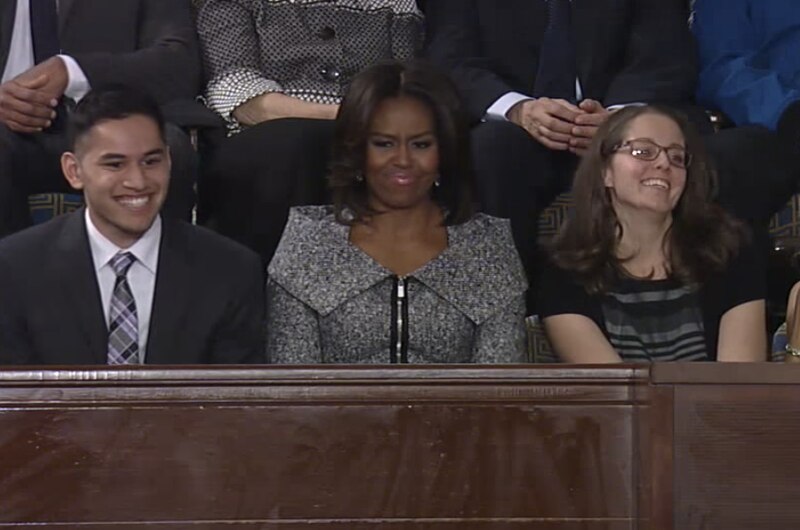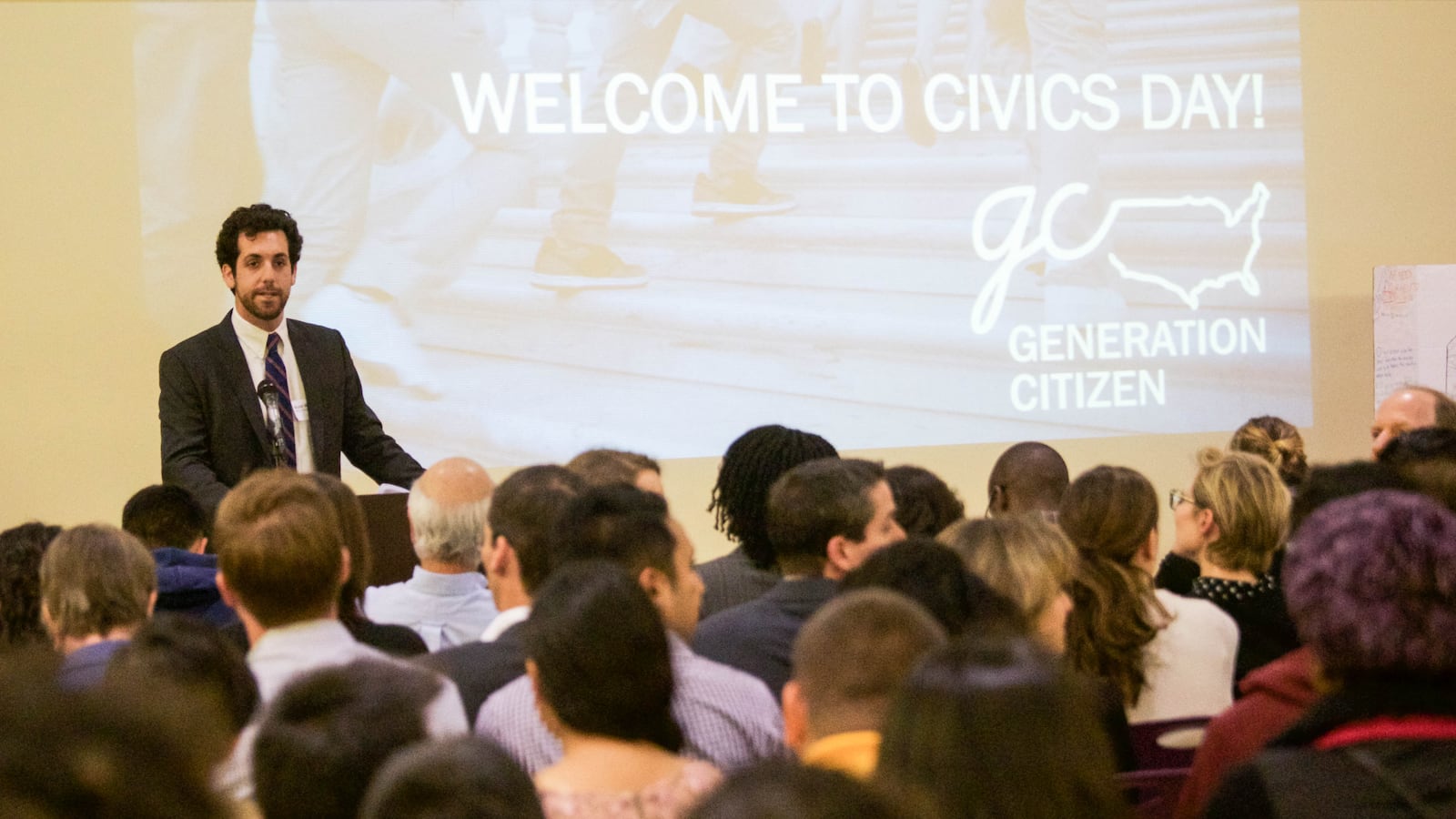On a Monday in January 2015, we were thrilled to find out that Anthony Mendez would be First Lady Michelle Obama’s personal guest at the State of the Union address.
Anthony had been a star student with Generation Citizen, the nonprofit where we serve as the CEO and a board member. The news felt like validation that our program worked — it had propelled a young person from not caring about politics to being a political star. Anthony was about to show its power to the entire country.
But the reality differed from the narrative. We didn’t know it then, but Anthony was actually about to drop out of college. He spent his moment in the sun feeling like a fraud — an experience he recently detailed in a powerful piece published on Vox.
We’ve spent a lot of time reflecting on the ways we used Anthony’s success to our own benefit. We’ve also spent time thinking about Anthony’s own feelings of shame at not being able to cut it in college, despite years of hard work.
We recognize now that our own glamorization of Anthony’s story demonstrates something subtle and dangerous: our collective tendency to elevate exceptions to the results of inequality in our society. This is a call for others in positions of power to question how we tell those stories.
*
Generation Citizen is an organization that works to make politics real for young people. Over the course of a semester, students in New York and elsewhere choose local issues they care about and take real action. They present issues to community leaders. They ask local council members to push legislation for body cameras to curb police brutality, advocate for increased funding for teen jobs, and talk fluently about the school-to-prison pipeline. Our goal is for young people to recognize their own voices by using them to make a difference in their own communities.
We work with thousands of students each year, but Anthony, who is from the Bronx, was a stand-out. After his semester with Generation Citizen ended, he traveled to Albany to lobby for a bill we were pushing, received one of our fellowships, and interned with a City Council member. Before long, he became the face of our program. He was charismatic and articulate, and his passion for politics as a young person embodied everything we believed in.
As soon we found out that he would be at the State of the Union, the organization sprang into action. We sent an alert to let all of our supporters know that Anthony was the First Lady’s guest, and sent press releases to reporters touting Anthony’s experience as an example of Generation Citizen’s impact.
That night, our team watched President Obama’s address. As the cameras panned to the First Lady, we saw Anthony sitting directly to Michelle Obama’s right. The smile we knew so well was beaming at millions of American households across the country. He was a star — our star.
Anthony called us that night, thanking us for the opportunity and telling us how excited he was. “I’m going to be back here one day,” he said. We didn’t doubt it.
*

Over the next few months, Anthony’s story became Generation Citizen’s story. We used him in our materials we sent to our biggest donors. He was the keynote speaker at our Civics Day, regaling other students with stories of meeting the president and walking through the West Wing. And Anthony, by all outside appearances, continued to prosper. He started school at Hartford College and visited the White House again to talk about “beating the odds.”
In August, Anthony came back to visit us. But he wasn’t there to celebrate his latest success.
It turned out that, in a story all too familiar for first-generation college students, Anthony had been struggling mightily. He was not adjusting to college life and not receiving adequate mentorship. He’d almost failed out of college his first semester. In fact, on the night of the State of the Union address, his grade point average was 0.8.
He told us that, two days before the invitation to the State of the Union, he had been crying on the phone with his mom, thinking he would have to drop out of college. He prayed that night. And when the White House called with an invitation to the President’s address, he thought it might have been an actual response from God.
Hartford had no warning that one of their students would be a guest of the First Lady, and officials were further baffled when they checked Anthony’s academic record. When he returned from the nation’s capital, Hartford’s leaders, including the president of the college, met with him to provide support. Because of his academic standing, he technically should not have been invited back for the second semester.
Just like everyone who meets Anthony, though, the entire administration was taken by his charm and his efforts to engage with his studies. They loved him, and did everything they could to help him succeed. They boosted his financial aid. They provided tutoring. But nothing worked. His GPA continued to falter, and Hartford eventually asked him to leave.
How do we reconcile the fact that Anthony was our organizational success with the reality that he ended up feeling like a failure?
And what does it mean that we propped him up and essentially exploited him — as so many nonprofits do with the individuals, mostly poor and people of color, who go through their programs?
*
Most of us enjoy a real-life Horatio Alger story in which someone, especially a young person, rises above the direst of circumstances to assume a position of fame or wealth. Such stories affirm the idea that hard work and a strong will are sufficient to overcome otherwise insurmountable obstacles, including centuries-old systems of oppression.
They also give life to the seductive myth that those who have not risen above their circumstances have only themselves to blame. The rags-to-riches story makes invisible the power of privilege and the devastation of systemic oppression.
Even well-meaning defenders of a democratic and inclusive society are susceptible to the appeal of a story of a nearly impossible triumph over great odds. They are drawn to the notion that a moment of stardom, or a powerful single act directed at a young person born into discrimination and oppression, is sufficient to set her or him on a path of triumph.
Remember, for those who labor to mitigate the effects of poverty and injustice in the lives of the nation’s youth, the rewards are few. And so when it seems a victory has occurred, it is easy to succumb to the temptation to crown a new superhero — without realizing that could give new life to a myth of rugged individualism that makes young men and women of color believe they alone are responsible for their perceived failures.
*
Anthony’s story contains some of these familiar themes.
On the surface, his State of the Union invitation appeared to be the opportunity of a lifetime for a young Latino man who grew up in poverty in New York City. Anthony had “made it.” In reality, the limelight thrust upon him, and the responsibility to represent the elevation of young people like him, was premature.
It is important to keep in mind what identities Anthony did and did not bring with him to the State of the Union Address. He did not enter it having accomplished an outstanding feat like Malala Yousafzai, who understood the source of her oppressed status and courageously stood up against it, carving out an identity in the process. Anthony did not attend with the identity of a Muhammed Ali, who too had confronted his own oppression and forged his own identity as a black man in America through that struggle.
Anthony had worked hard. But he came to this major event primarily as a star-struck attendee, grateful to be invited. Anthony was there because someone else had determined that he symbolized hope for a more inclusive and democratic America.
We must acknowledge that at its core, bestowing the status of superhero upon someone is in itself an act of oppression, denying him or her the opportunity to claim one’s own humanity through purposeful struggle. That status also means that, when Anthony did fail, it was perfectly logical for him to blame himself.
Anthony will always bear responsibility for his life and his decisions. But life has not been difficult for him because he was not smart or had not worked hard enough. His failing out of college was certainly not because of a lack of desire.
Students like Anthony do not realize that segregation and poverty mean that they have had grossly inequitable opportunities to learn. It’s heartbreaking to think that, as he sat next to the First Lady and worried about having to leave college and being “found out,” he blamed himself for systems in place long before he was born.
To be clear, the First Lady is not a villain in this story, and we don’t think Generation Citizen is either. We see now that our response wasn’t wrong, but it was premature, and perhaps naive. It came from the need to validate the hard work of building a democracy, brick by brick and youth by youth. Reflection by both parties may reveal that we may have needed to raise Anthony to superhero status to validate our work more than Anthony needed this experience.
His story has made us ask important questions. How can we tell the story of Generation Citizen with integrity while still proving that the program works and attracting resources? What does success for us, and our students, actually look like?
For now, we hope that Anthony’s life story is one of success — of his own definition. Our job is to try to tell Anthony’s story with all the dignity and veracity that it deserves. We have not done so yet.
Scott Warren is the co-founder and CEO of Generation Citizen. Sylvia Rousseau is a professor at the University of Southern California who studies urban school reform, a board member at Generation Citizen, and a former Los Angeles principal and superintendent.
About our First Person series:
First Person is where Chalkbeat features personal essays by educators, students, parents, and others trying to improve public education. Read our submission guidelines here.


